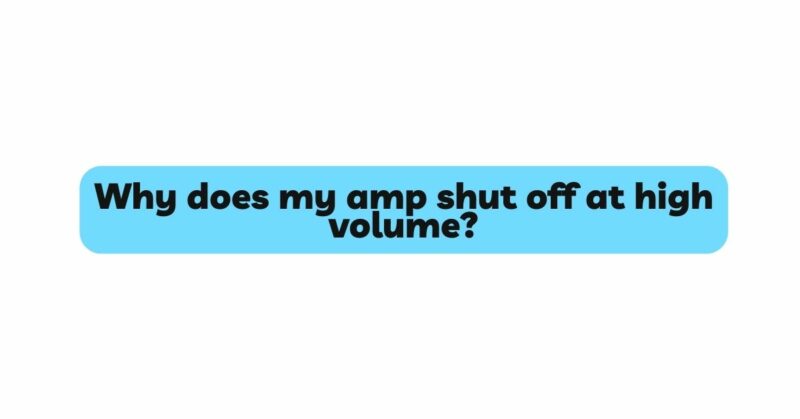As a musician, there’s nothing more disheartening than cranking up your amp to achieve a powerful and commanding sound, only to have it abruptly shut off at high volume levels. This frustrating issue can disrupt your performance, hinder your creative flow, and leave you searching for answers. Understanding why your amp shuts off at high volume is essential to prevent interruptions during crucial moments of your music. In this article, we will explore the various reasons behind this problem and provide practical solutions to help you enjoy uninterrupted and powerful performances.
- Overheating and Thermal Protection
One of the most common reasons for amp shutdown at high volume is overheating. When amplifiers are in use, they generate heat, and if the internal temperature rises to unsafe levels, the amp’s thermal protection circuit activates, automatically shutting down the amplifier to prevent damage. Overheating can occur due to inadequate ventilation or prolonged use at high volume levels. To avoid this issue, ensure that your amp is placed in a well-ventilated area, away from obstructions that may block airflow. Consider using external cooling fans or cooling stands to aid in heat dissipation, particularly during extended performances.
- Inadequate Power Supply
An insufficient power supply is another factor that can lead to amp shutdowns at high volume levels. Check the power cord, power outlet, and any power-related components for damage or loose connections. Using a power conditioner can protect your amp from power surges and voltage fluctuations. If the power supply is inadequate for your amp’s requirements, consider upgrading to a higher-capacity power source that can handle the demands of high volume.
- Impedance Mismatch
An impedance mismatch between the amplifier and speakers can cause overload and result in the amp shutting off. Ensure that your speakers’ impedance matches the amp’s specifications. Using mismatched impedance can lead to distorted sound and potential damage to your amplifier.
- Faulty Power Tubes (For Tube Amps)
For tube amplifiers, faulty power tubes can contribute to shutdowns at high volume levels. Tube failure or malfunction can lead to inconsistent power output, causing the amp’s protective circuits to engage. Check the power tubes for any signs of damage, such as a blue glow or white residue, and replace them if necessary. Properly biasing the new tubes is crucial, so consider seeking assistance from a professional technician.
- Internal Component Issues
Internal components within the amp’s circuitry can become damaged or faulty over time, leading to shutdowns. Inspect the internal components, including capacitors, resistors, and transistors, for any visible signs of damage or burns. If you identify faulty components, have them replaced by a qualified technician.
- Speaker Wiring Problems
Faulty or loose speaker wiring can also cause the amp to shut off. Verify that all speaker connections are securely fastened and free from damage. Rewire or repair any faulty speaker connections promptly.
- Check the Speaker’s Efficiency and Power Handling
The efficiency and power handling of your speakers play a vital role in their ability to handle high volume levels. If your speakers are not rated to handle the amp’s power output, they may become overwhelmed, leading to shutdowns. Consider upgrading to more efficient and higher power-handling speakers to avoid this issue.
- Dirty Controls and Switches
Dust and debris can accumulate in potentiometers and switches, leading to connectivity issues and triggering shutdowns. Regularly clean these components with electrical contact cleaner to maintain proper electrical contact.
- Address Factory Presets and Settings
Some modern amps come with factory presets and default settings that may not be suitable for high-volume performances. Review and adjust the amp’s settings to suit your performance needs and avoid potential shutdown triggers.
- Evaluate the Room Acoustics
The acoustics of the room or venue you’re playing in can also impact your amp’s performance. Sound reflections and standing waves can cause feedback and instability, leading to shutdowns. Address the room acoustics with sound-absorbing panels or bass traps to improve sound dispersion and prevent acoustic issues.
Conclusion
Experiencing amp shutdowns at high volume levels can be frustrating and detrimental to your musical expression. By understanding the potential causes and implementing preventive measures, you can minimize the risk of amp shutdowns and enjoy uninterrupted and powerful performances.
Checking for overheating and ensuring proper ventilation, addressing power supply issues, and verifying impedance matching are crucial steps to prevent amp shutdowns. For tube amp users, inspecting power tubes and internal components can help maintain consistent power output.
Regularly cleaning potentiometers and switches, checking speaker wiring, and using high-quality and suitable speakers all contribute to the proper functioning and longevity of your amp. Addressing factory presets and settings, along with evaluating the room acoustics, will also help create a stable and reliable performance environment.
Remember that your amp is a vital tool in your musical journey, and taking care of it will ensure that it serves you well for years to come. By preventing amp shutdowns, you can focus on delivering powerful performances and creating a lasting impact on your audience. Happy playing, and may your music resonate seamlessly with your listeners!


